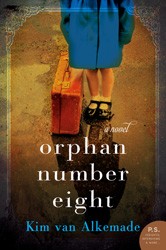Ruth Gilligan’s debut novel is set in Ireland and London in three different time periods. In 1958, a mother and father have their son Shem admitted to a private asylum; he has become mute for reasons unknown to them and is an embarrassment to his father. As the novel progresses, Shem’s much beloved mother, his Ima, visits and begs him to find his voice again. But there is more at work than she may realize, and Shem later writes, “I wondered now if a family could ever really exist without these lies, these secrets to keep it alive. Or if, in the end, that was the definition of love.” This question is the lodestone of Nine Folds Make a Paper Swan.
In modern-day London, Aisling, a young Irish-Catholic woman, ponders a religious conversion. But will it come at the cost of her relationship with her family? At the turn of the 20th century, Ruth, a newly immigrated Lithuanian girl, struggles to create a home with her family in Cork, Ireland. Her father embraces the culture, while her embittered mother longs for a new life. The boy Shem befriends his roommate at the asylum and begins to examine his own long-held beliefs. These three story lines are knit together by the themes of family and belonging. At times, the symbolism feels a bit overwrought. Nonetheless, the language has a spare quality to it that transports the reader with transgressions of word-play. The symbolism of the swan — with its connotations of love, purity and sacrifice — haunts this work of fiction.
As the novel moves into the modern era, the author disrupts time to focus on the mundane, the small moments. “She paused … her body suspended on the inhale. The possibility. Until the earth gave way and the sleán oozed in — through the white stuff at the top and then the proper filthy black.” The contraction and expansion of time give the narrative a sense of immediacy. James Joyce has told us that, “in the particular is contained the universal.” As the characters in this novel move toward personal truths, the constructs of family, nationality, and culture all come into question.
Nine Folds Make A Paper Swan features characters who are all the more tangible for their questing nature, their fallibility. Ruth Gilligan writes expressively of the Jewish experience in Ireland while embracing the universal human need for community and belonging.
Related Reads:





